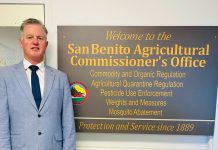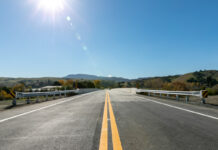The Sunnyslope County Water District will likely choose between
building a new wastewater treatment plant or connecting to
Hollister’s plant in the next month.
HOLLISTER
The Sunnyslope County Water District will likely choose between building a new wastewater treatment plant or connecting to Hollister’s plant in the next month.
Both options have advantages, said Water District Manager Bryan Yamaoka, and both will likely lead to substantial rate increases for Sunnyslope’s 1,200 wastewater customers in Ridgemark, Quail Hollow and Oak Creek.
The district’s average monthly sewer bill is currently just under $35, Yamaoka said, and that rate could climb to more than $100 in 2011.
Increased rates will help fund the wastewater treatment improvements, which Yamaoka said are required by the Central Coast Regional Water Quality Control Board. Building a new treatment plant would cost around $13.7 million, while connecting to Hollister’s plant would cost around $16.9 million.
“We’re under the gun to do something,” Yamaoka said.
The water district held a public workshop Monday to discuss its options with customers. Yamaoka said most attendees favored a new treatment plant because it would give them more control over future developments.
“We heard from a lot of people that the district was created for local control, for a local purpose,” he said.
But Yamaoka also warned that the 96 people who showed up Monday may not be representative of all Sunnyslope customers.
Ridgemark resident Fannie Curro is one of the customers who skipped out on Monday’s meeting, although she said Wednesday she had wanted to attend. Curro is worried about increasing sewer rates, and she noted that Sunnyslope customers on fixed incomes may not be able to afford the hikes.
Increasing payments could eventually convince Curro’s family to move away, she said.
“We don’t even have a viable choice,” Curro said. “There has to be another solution to this.”
The district’s board of directors will likely make its choice Jan. 10, Yamaoka said. A major factor in the decision will be availability of recycled water for parks, landscaping and other purposes, he said. The city probably won’t be able to provide any recycled water in the near future, while there’s a guaranteed supply if the district builds a new plant.
With the high cost of water and the state’s current shortage, Yamaoka said, “Recycled water is probably in everybody’s future.”









